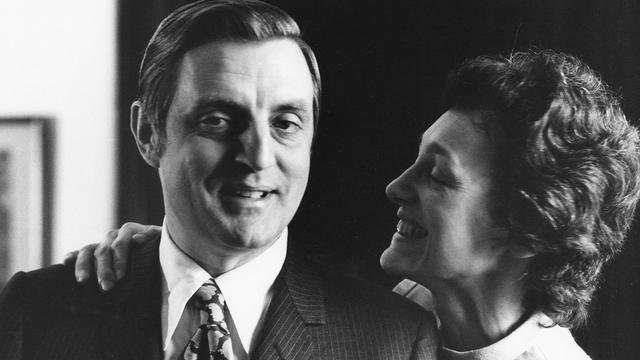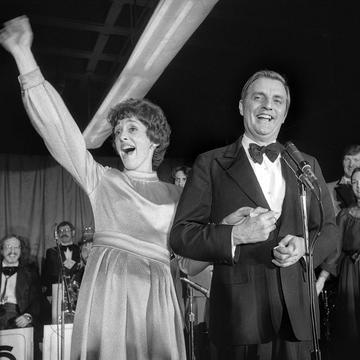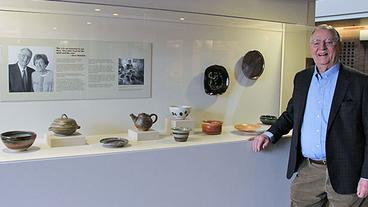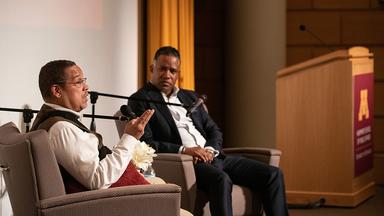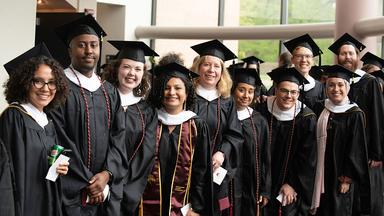It was 1972 when Joan Mondale wrote these words to introduce her book, "Politics in Art," which explores how artists can inform the debate over issues facing society:
There is a close relationship between the concerns of the artist and those of the politician. Both deal with human emotions and human conditions. Both seek to tell us about the good and the bad in the world around us. Many times the artist is commenting on the same conditions of social outrage and human failure that the politician is seeking to correct.
This passage gives us greater insights into the public lives of Mrs. Mondale and her husband, former senator and vice president Walter Mondale. He was the lifelong politician, serving in public office in Minnesota and Washington, DC, while she was the champion of the arts, ambassador of cultural diplomacy, and unfailing supporter of her husband.
The Mondales were a power couple of the 1960s and 1970s Washington, arriving in 1964 when Mr. Mondale began serving in the U.S. Senate, through his term as vice president from 1976 to 1980 and his campaign for the presidency in 1984. Both were committed and enthusiastic public servants who helped redefine the roles of political spouses.
To honor the Mondales’ significant contributions to public life, the Humphrey School of Public Affairs has renamed its main public gathering space the Joan and Walter Mondale Commons.
“We know that nobody achieves the level of success that Walter Mondale reached without strong allies and dedicated life partners. For all their political and personal lives together, Joan and Walter Mondale were a mighty team,” says Humphrey School Dean Laura Bloomberg. “We are proud to recognize the substantial public contributions the Mondales have made to the country, the state of Minnesota, and the Humphrey School.”
Partners in Washington
After arriving in the Senate, Walter Mondale made his mark in part by working together with his longtime friend Hubert Humphrey, who was vice president.
“We were very close, like father and son, especially in the early years,” says Mondale. “The record that we established set the pace for reform—Medicare, Medicaid, quality education, environmental protection, the elements of modern progressive life—we were there working on those issues together.”
Joan Mondale played her part as well, when in 1969 the family decided to live for a week on the food budget of welfare recipients. It was a way to understand the desperation and degradation that poor people face every day, she said afterward.
Mrs. Mondale also helped start a food co-op in her neighborhood in Washington, DC.
“We tried to work out a way of helping to improve society during those times,” says Mr. Mondale. “Joan wanted to do that in many ways, but especially through the arts.”
Joan Mondale had a background in the arts, studying it in college and working in museums early in her career. Over the years, she became a successful artist in her own right, primarily in pottery and ceramics. She was active in the arts scene in Washington, giving tours at the National Gallery of Art and serving as honorary chair of the Federal Council on the Arts and Humanities.
“She took on this role as a public champion of the arts because she thought it was important,” the Mondales’ oldest son, Ted, says. “She decided that was going to be her role, and she took it on with great enthusiasm.”
But Mrs. Mondale’s role as confidante to her politician husband was even more important.
“She would travel with Dad a lot and keep her own schedule. He would talk things through with her because her opinion really mattered to him,” says Ted Mondale. “She liked the political life. She had so much energy, you would never see her being fatigued or tired. She would always just go, go, go.”
“Over my many years in politics, I have rarely seen a political couple so effective in serving together to advance the public interest,” says Jim Johnson, a longtime Mondale friend and political aide. “Much of the credit goes to Mrs. Mondale and her insightful approach to public service. The role of political spouse can be a highly public one, with relentless demands on time, and plenty of stress. And yet, Mrs. Mondale seemed genuinely to relish it.”
Cultural diplomacy in Japan
Perhaps Joan Mondale’s greatest impact came when the couple moved to Japan in 1993, when Walter Mondale was appointed ambassador to that country. By then, she had acquired the nickname Joan of Art.
Relations between the two countries were strained at that time, and Mr. Mondale claims that of the two of them, Joan was the more popular.
“The Japanese people love the arts. Joan was on the road all the time, meeting with leading artists and often throwing a pot or two while she was talking to them. I was working on trying to sell auto parts,” he recalls with a laugh, “and I needed her help. I needed to look better than I was. She helped put a little class into things.”
Back in Minnesota, but not slowing down
After retiring from “official” public service, Joan and Walter Mondale continued their active involvement in the community—she by supporting artists and arts organizations, he by practicing law, championing progressive causes, and supporting higher education, especially at the University of Minnesota. Mrs. Mondale died in 2014.
As part of the Humphrey School’s recognition of the couple, the School has installed a display case featuring a collection of Joan Mondale’s pottery.
“It will remind us of the importance of the arts and beauty in our lives, and of the remarkably effective diplomatic work that Joan and Walter Mondale collectively shared with the world,” says Dean Bloomberg.
Walter Mondale continues to be a regular presence at the Humphrey School, as a member of the dean’s advisory council and as an instructor. He also recently spearheaded a successful fundraising campaign that raised $2 million for student scholarships.
He says he is humbled and honored to see his name, along with his wife’s, displayed on the wall for students and visitors to see every day, “especially because it reminds people what a remarkable person Joan was.”
“The Humphrey School is about learning and it’s about service. It's about decency and honesty. And if they look at what Joan’s life was about, all those elements were there all the time,” he says. “I tried to do my part as well, and we were a good team for all those years. So maybe our presence on the walls will cause a few people to ask ‘what did they do?’, and it will inspire more of the same.”
